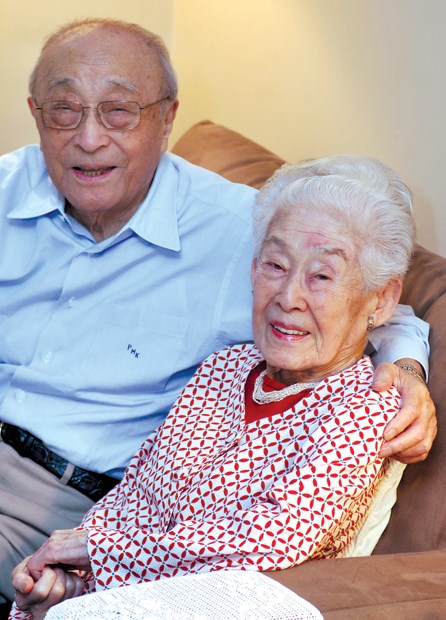Twenty years ago, after a lifetime in Japan, Marie and Peter Katsuno came home. "Somewhere inside of me, for all that time, I was always Canadian," says Marie.
When the Second World War changed the world forever, Marie Kawamoto, a Canadian, and Motonobu (Peter) Katsuno, an American, found themselves in Japan, a country where they had never been, with a culture they did not know and a language they barely spoke.
Peter was born in Seattle in 1914, 100 years ago. This column started out to be the story of a man's century well lived. The circumstances of Peter and Marie's lives, however, merit particular attention during this time of remembrance.
Marie was born in Vancouver in 1923. Her family was in West Vancouver by the 1930s, living behind the walls of the Great Northern Cannery. Marie's mother worked on the canning line, her father was an independent fisherman. Marie was a student at West Vancouver high school where she learned typing and shorthand from Mrs. Reid. "She was English and very strict," recalls Marie. "What Mrs. Reid taught me would be important in my life."
Peter went from a family of market gardeners to a business degree from Chicago's Northwestern University. In 1941, while on a visit to see his grandparents in Japan, he was hired by an international trading company, his specialty at business school. When the Pacific War broke out in December, Peter was assigned Japanese citizenship and inducted into the army.
"There were about 15 of us Nisei, schooled or raised in the United States," recalls Peter. "We were in military intelligence, shipped off to China and then to South Korea as code-breakers. Sure, we could speak English but we didn't know anything about cracking codes."
Marie graduated in 1941. She worked alongside her mother at the cannery and continued to study Japanese. Then came December and Pearl Harbor.
"We were among the last evacuees, sent by train to Hope and then by truck up the mountain to Tashme."
For the four years of internment, Marie helped teach the children in the camp. When the B.C. Security Commission registered a school at Tashme, Marie was able to earn her teaching credentials at New Denver.
For Japanese Canadians, war's end in 1945 brought release from the internment camps but not freedom. "We were ready to go home," says Marie, "but that was not to be. Our family chose to return to Japan. We went by troopship way down in the hold, but my father was a man of the sea, and I could rock and roll on any boat. Though we found desolation in Japan, I was young and when you're young, you're kind of adventurous. I decided to make the best of things."
Marie's skill as a stenographer led to work with the United States military in Yokohama and eventually to meet her future husband.
Why did they stay?
For many reasons, chiefly because Peter's United States citizenship was denied continually over the years, while his career in international trading flourished.
"At the time, it seemed that I was stranded and things were going against me. It turned out though, that due to my education in international trade and my ability to speak English, opportunity came in postwar Japan that would not have happened back in America. That was how the world turned for me."
Marie volunteered with Bunko, an organization helping children learn and retain English. "Ours was the Maple Bunko - that helped me remember Canada."
That their children, having one Japanese Canadian parent, were able to become citizens of Canada, was a bright spot in their lives.
In 1994, Peter and Marie decided to return to their roots, choosing to live their retirement years in West Vancouver, where Marie lived, worked and studied more than 50 years ago.
When a couple reaches 100 and 91 years of age, many significant anniversaries have accumulated. For Peter and Marie, one such day is their wedding - 67 years on Dec. 26 this year. Another is July 27, 2011, when Peter Katsuno, at the age of 97, became a citizen of Canada.
Laura Anderson works with and for seniors on the North Shore. 778-279-2275 [email protected]



